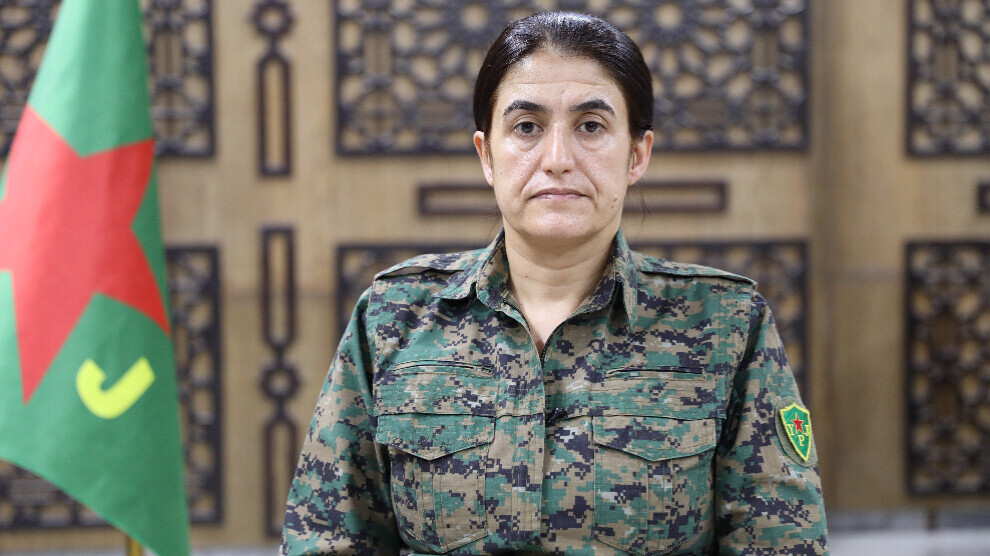Bêrîtan Hêvî has become a symbol of hope and resistance. The guerrilla commander was encircled by KDP peshmerga 31 years ago, on 25 October 1992, and refused to surrender. Instead, she resisted to the last bullet, destroyed her weapon to prevent it from falling into enemy hands, and threw herself off a cliff to avoid capture. She became the symbol of the women's army that was founded shortly afterwards. Rohilat Efrîn from the General Command of the Women's Defence Units (YPJ) spoke to ANF about the significance of Bêrîtan today.
The YPJ commander pointed to the legacy left by Bêrîtan and said, "We congratulate the women of the Middle East and the world on the 30th anniversary of the founding of the Free Women's Army. Just as the women's army has represented the will of the free woman in the past and in the present, it will continue to do so in the future. If we look at the history of humanity, there have been many attacks on society, its will and culture, and on women's identity. Around the world, many women's movements and individual women have risen up, resisted and fought patriarchy. Many women were tortured in this resistance, hundreds were burnt to death. But the wave of women's resistance and struggle against the patriarchal system continued.
"The women's army is more than a military organisation"
In terms of Kurdish reality, this means that the freedom movement, which organised itself under the leadership of free women against a fascist mentality that suffocated society in a system of slavery, built a women's army 30 years ago. This process continues to this day. Of course, the women's army should not be seen only as a military organisation. An army of free women means creating independent ideological, organisational, philosophical and women's studies knowledge and consciousness. It is necessary to look at the women's army in this light. Over the past 30 years, the women's army under the leadership of YJA Star has left a deep impression on women in the Middle East and around the world. It has a great effect on women who are enslaved and subjected to unjust and despotic systems. In this sense, the women's army is an expression of a counter-movement, a voice against injustice and inequality. It has given willpower to women who could not stand up for themselves, who could not defend their rights themselves, who could not express themselves in their own language and culture, and in the light of Rêber Apo's [Abdullah Öcalan's] philosophy, it has become for the benefit of all women in the world. Women all over the world have recognised and redefined themselves in this philosophy."
“YPJ has been fighting in the line of Bêrîtan for eleven years"
Rohilat Efrîn spoke about the many internationalist women who have joined the YPJ and continued: "The YPJ has been waging a great struggle for eleven to twelve years. It is a continuation of the thirty-year legacy of the free women's army and its great resistance. We have been fighting against the attitude of denying peoples' languages and cultures, occupying cities and trampling on people's livelihoods and values for years. From Kobanê to Afrin to Serêkaniyê, the YPJ has waged a great struggle against ISIS. ISIS has received support behind the scenes from many international powers and states. ISIS has been particularly aggressive against women. In contrast, the YPJ took a leading position in the struggle. Without a doubt, the YPJ has drawn its strength from the legacy of 30 years of women's resistance. Many women of different identities and backgrounds have participated in this struggle in Rojava. Women from many parts of the world joined the ranks of the YPJ and became pioneers of this spirit of resistance. The YPJ has defeated the most ruthless of dark forces in Rojava as an army and as a movement. They have become an identity and have made their voice heard in the world. They stand for a culture of resistance. This resistance has had an impact on many women and women's movements. These movements are coming to the fore today.
"Bêrîtan's action was an action of freedom against the line of betrayal"
Comrade Bêrîtan's resistance against the betrayal continues to have an effect until today. Comrade Bêrîtan carried out an action of freedom against the surrender imposed by the traitor mentality. The action of Comrade Bêrîtan means the following for us: Comrade Bêrîtan said to a power like the KDP, which has been following the line of betrayal for years, 'You will surrender to us, not we to you'. The line of Comrade Bêrîtan is a line that we are implementing ideologically, organisationally, militarily and in every way. It is a line that brings together all women who oppose treason and will never surrender to it. Just as Besê and Zarife did not surrender to the occupiers in the history of Kurdistan, Comrade Bêrîtan grew up with the culture they had created and built her resistance on it. She clearly showed that wherever surrender and betrayal are imposed, there must be resistance and a culture of never surrendering.
Today, the YPJ puts up the greatest resistance against all occupying powers on the basis of this heritage. It has developed a culture, idea and philosophy from this heritage. The YPJ will continue to uphold this stance in the future. However, the KDP's course based on betrayal and surrender against the line of resistance also continues to this day. The Turkish state attacks our areas and cities every day. We have thousands of martyrs and will continue to have martyrs every day. The KDP takes its place as a collaborator alongside this occupying power. It wants to spread a line of surrender among our people and our defence forces. It attacks the achievements of the resistance in Rojava. Of course, all women and our people in Rojava should take a stand against this course. The surrender to be imposed on us by the enemy means the eradication of our land, culture and values. The strongest reaction and the strongest stance against this betrayal is to oppose it in struggle and in insisting on the right path. People like Bêrîtan are great examples of this in our history. We as YPJ have been resisting and fighting for eleven years, and even today the line of resistance is our guide. We are convinced that with this attitude and determination, our people will also persist in the line of resistance."














